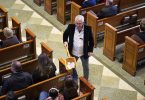by Dennis Sadowski
WASHINGTON (CNS) — Indigenous people in Bangladesh face threats to their way of life because the government is ignoring long-standing land ownership rights, two advocates said during a visit to the U.S. Conference of Catholic Bishops.
Oblate Father Joseph Gomes of the Diocese of Sylhet, in northeastern Bangladesh, and Sanjeeb Drong, general secretary of the Bangladesh Indigenous Peoples Forum based in the capital of Dhaka, said indigenous people are being forced from the rural lands their ancestors have lived on and farmed for centuries to make way for the majority Bengali population.
The indigenous have been relegated to “second-class” status by the government, allowing for their removal from areas in northern provinces and the Chittagong Hill Tracts in the southeast, Father Gomes said.
The indigenous population encompasses about 3 million people, a small percentage of Bangladesh’s estimated 160 million inhabitants. They belong to 54 different ethnic groups in a country the size of Iowa. The country is nearly 90 percent Muslim and about 10 percent Hindu, with a handful of Christians and Buddhists.
About 90 percent of indigenous people have lost their land holdings, the men told a small gathering at USCCB headquarters.
“The big problem is that the Islamization of indigenous areas is getting stronger,” said Drong, who hails from an indigenous community in the country’s north. “Intolerance toward non-Muslim people is increasing today.”
Bangladesh won its independence from Pakistan in 1971 after a particularly brutal nine-month civil war. Since then, indigenous people have struggled to maintain their identities and traditional land holdings.
The situation has worsened since 1988 when Bangladesh’s constitution was amended to make Islam the state religion, explained Father Gomes, who is of the mainstream Bengal community, but works for the Sylhet Diocese’s Justice and Peace Commission advocating for indigenous people.
“For Sylhet and likewise in other dioceses, we need a very strong leadership, even in the church,” the Oblate said. “(We need) priests and nuns to work together with the people’s organizations so we can protect these indigenous peoples’ rights, especially the land rights. That’s very urgent. That’s not really very possible without any support [from the church].”
The country’s constitution was amended again in 2010 and 2011 to redefine indigenous populations as “tribes,” “minor races” and “ethnic sects and communities.” Without the indigenous designation, the minority population is unable to secure protection under U.N. protocols.
“We need to change the attitude of the government,” Father Gomes added.
Drong said much of the drive to move indigenous people is fueled by efforts to boost tourism and to allow three companies to expand their production of tea, a staple in Bangladeshi life.
Indigenous Bangladeshis also face threats from a small insurgency driven by an adherence to the ideology of the Islamic State group as well as climate change, which is causing low-lying areas of the country to be inundated by seawater, forcing the government to relocate people to other areas, including some indigenous lands, the men said.
Pleas by indigenous groups for land and human rights largely have been ignored by the government despite ongoing demonstrations, community meetings and repeated outreach efforts to authorities, Drong explained.
During an interview with Catholic News Service after the gathering, Drong called for special measures from the Bangladeshi government to protect the human rights of indigenous communities.
“It’s not like saying, ‘We all are human beings and people all have equal rights.’ That is fine, but it doesn’t work. Special protections, special measures are needed for indigenous people,” he said.
The men participated in the U.N. Permanent Forum on Indigenous Issues May 13. In its 15th year, the forum is an annual two-week program examining indigenous issues related to economic and social development, culture, the environment, education, health and human rights.
The men also planned to meet with an official at the U.S. Department of State to discuss their concerns in the hope that the United States would stress the importance of upholding indigenous rights with Bangladeshi officials.
“We seek U.S. government support,” Drong said. “They should speak when they see a violation of human rights, destroying the buildings, burning houses. It’s in the newspaper these reports. Then they should speak. They should at least express their concern about what is going on with indigenous people with the government.”
Father Gomes and Drong told CNS they have received threats for their advocacy. At one time, Drong was run off the road while riding his motorcycle and had to flee on foot, fearing for his life, he said. Father Gomes said threatening messages have been left on his phone and a member of parliament suggested he work in traditional ministry rather than “politics.”






